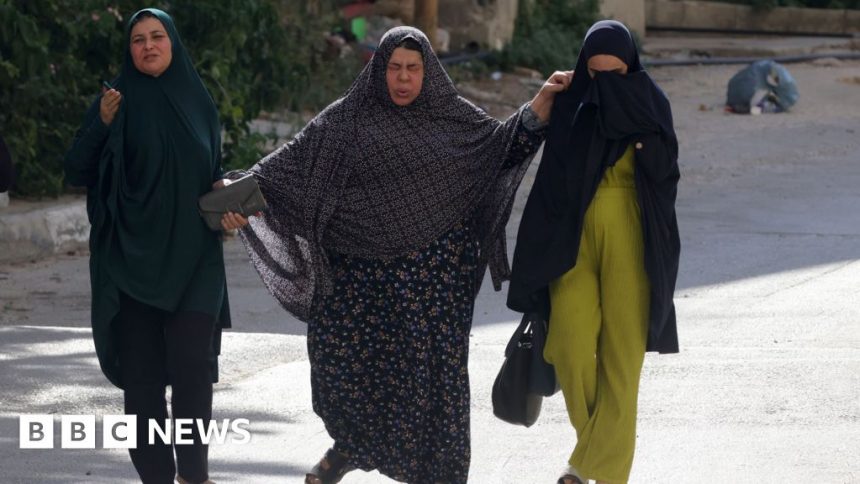Families leave Jenin during Israel West Bank push
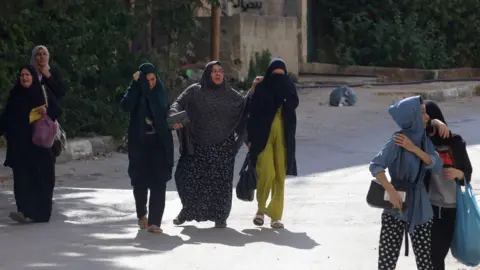 EPA
EPAThe first families have begun to trickle out of Jenin camp, sealed off for almost four days by an Israeli military operation.
There was fierce fighting inside the camp on Saturday, with battles reportedly taking place in the central Damaj neighbourhood, where armed groups have a strong presence, as well as near the camp entrances.
Out of the gunfire, under the constant buzzing of military drones, the figures of several women and children threaded past Israeli army vehicles. Alone on the deserted road, among the military trucks, they looked small and out of place.
Oruba Shalabi, scared, distressed, and carrying her two-month-old daughter, told us what they had experienced inside the camp.
“They were firing at us and throwing hand-grenades at homes,” she said. “Half our home was blown up. We were hiding in the kitchen and shouting to tell them that we have a baby.”
Oruba says she went to the doorstep to tell them that the children in the house were afraid and struggling to breathe from the smoke.
“They told us we had two minutes to go out,” she said. “They checked our phones and IDs, made us stand in the sun for half an hour, then told us to walk straight ahead.”
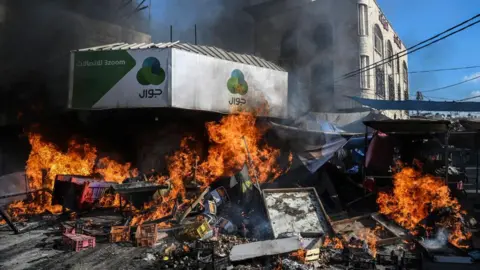 Getty Images
Getty ImagesOruba left on foot, just as she was, with her mother, aunt, sister and niece. It’s the first time they have been able to leave their home since Tuesday night.
“There was no electricity or water [in the camp],” she said. “They were shooting at anyone coming close to the windows. All our neighbours were forced out and we were all put in one room. They got the young men to sit on the floor and tied them up.”
The fighting in Jenin intensified on Saturday. The Palestinian Red Crescent has said there are at least two bodies inside the camp they have been unable to retrieve. The Palestinian health ministry has said one of them is an elderly man.
There are also unconfirmed reports of Israeli army casualties. A statement from one of the armed groups – al-Aqsa Martyr’s Brigade – claimed its fighters had engaged soldiers in an ambush in Damaj.
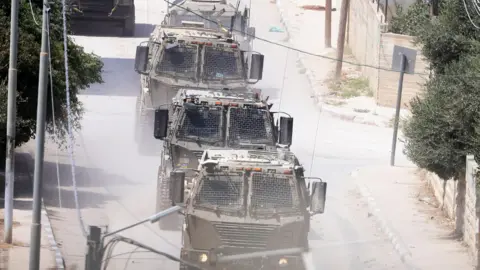 EPA
EPAIsrael’s operation this week began with incursions into several cities and refugee camps in the north of the occupied West Bank. Over the past three days, the focus of that operation has narrowed to Jenin, as troops have pulled out of Tulkarem and Tubas.
Early on Friday morning, the Israeli army confronted and killed the man it says headed Hamas in Jenin, Wissam Khazem, along with two other men it said were wanted for shooting attacks.
But this operation is still ongoing, with reports that Israeli forces are moving deep inside the camp to search house-to-house for other wanted men.
Israel says it has killed 20 armed fighters in the operation and recovered weapons including M16 rifles and explosive devices.
The Palestinian health ministry in Ramallah says that 20 people have been killed across the West Bank. The head of the UN agency dealing with Palestinian refugees, Philippe Lazzarini, says children are among them.
One of those killed is an 82-year-old man whose body was found with nine bullet wounds on Friday, a paramedic told the BBC.
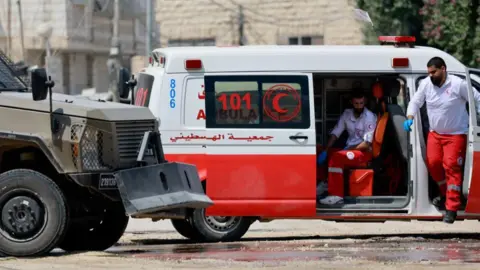 Reuter
ReuterIsrael says this is a counter-terrorism operation to dismantle armed Palestinian groups, which it believes are backed by Iran.
An attempted bomb attack in Tel Aviv earlier this month has also sparked alarm in Israel that the threat of suicide attacks in Israeli cities will resurface.
Overnight, Israel’s army said there were two attempted attacks on settlements in the southern part of the West Bank. Its chief of staff, Herzi Halevi, said the ongoing operation in Jenin was aimed at preventing exactly these kinds of attacks.
Tensions over the Gaza War – and repeated military incursions into the West Bank – are changing attitudes and tactics here on both sides. The risk is that they will push the conflict here into a new and more dangerous phase.



